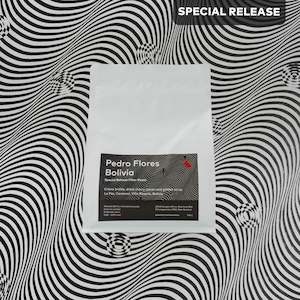Pedro Flores, Bolivia, Filter

Roasted for Filter
This coffee was produced by Pedro Flores in the colonia of Villa Rosario, located 180km from La Paz in the heart of the Caranavi province. This region is the epicentre for coffee production in Bolivia, with extremely high altitudes, rich soil and wide daily temperature ranges providing great conditions to produce exceptional coffee.
Pedro’s farm, El Mirador, is 10 hectares in size and is located at 1,500–1,670m above sea level. The farm is planted with heirloom Caturra, Catuaí, and Typica varieties, and the harvest runs from June to October, with the peak harvest in June and July. The cherries used for this lot come from the most elevated part of the farm, where the ripening process is slower, allowing the sugars to develop more evenly to produce a very sweet coffee.
Pedro Flores was born in the Aroma province, in the department of La Paz. When he was six years old, he and his family moved to Caranavi. At the time, there was a crisis in the mining sector, because the commodity price for minerals was very low. To try to boost the economy and support the poorest communities in Altiplano (a town above La Paz), the government gifted parcels of land in Caranavi to many families, including Pedro’s, to encourage them to move out of La Paz and find other ways to build a living.
Pedro inherited his family’s farm when he was just 14 years old, and at 18 he started growing coffee, alongside tomatoes and citrus fruit, on the farm. Like many families in Villa Rosario, Pedro initially relied on selling his coffee at the local market, which meant low prices and little reliability. Over the last decade, Pedro has focused on producing specialty coffee, which results in higher premiums paid for his coffees and allows him to maximise the potential of his land. Today, he selectively picks his coffee cherries and sell his top-grade coffees for substantially higher prices to our partners the Rodríguez family at Agricafe as part of their Sol de la Mañana program. This initiative is aimed at improving infrastructure and farming practices at farms in order to create a more sustainable future for coffee in Bolivia.
Pedro Flores has been part of Agricafe’s Sol de la Mañana program since its establishment in 2014. As part of the initiative, Pedro follows a very structured series of courses focused on improving both quality and, critically, yield quantity at his farm. The curriculum hones in on one aspect of farming at a time and includes information on building and maintaining a coffee nursery, when to prune and use fertiliser, how to avoid and treat leaf rust, and how to selectively pick coffee. Agricafe has also helped Pedro identify which parts of his farm to renovate and repair, with a focus on long term, sustainable, and ultimately profitable farming practices.
The results of the Sol de la Mañana program have been profound, with improved quality and quantities for all participating producers, including Pedro. He is now achieving yields of 30 bags per hectare; a significant achievement! Prior to participating in the program, his yields had fallen to less than six bags per hectare. Head here to learn more about this wonderful program, and here to learn more about the incredible work the Rodríguez family and Agricafe are doing in Bolivia.
ABOUT CARANAVI
The inhabitants of Caranavi first started farming coffee in the 1950s, when a government-led agrarian reform resulted in small parcels of land (of around 10 hectares in size each) being redistributed back to thousands of largely Aymara families. The Aymara are one of Bolivia’s 36 indigenous nations, who originally lived on the highlands of the Altiplano (a vast plateau of the central Andes that stretches from southern Peru to Bolivia and into northern Chile and Argentina). Along with the Quechuas, who lived in the Bolivian lowlands, both groups immigrated to Caranavi to find a better life through agriculture.
The municipality is located in the Yungas ecoregion, one of South America’s most fertile and diverse locations. The region runs along both sides of the Andes Mountains, and is known for the world’s highest lake, called Titicaca. In the Quechua language, Yungas translates to “the warm lands," in reference to the rainy, yet warm climate experienced in the region.
HOW THIS COFFEE WAS PROCESSED
This particular lot from Pedro Flores was carefully hand-picked and processed on the same day at the Buena Vista washing station. This meticulously run mill is owned by Agricafe, who painstakingly process each of the exceptional specialty lots they receive separately
- Store:
- Red Rabbit Coffee Co
- Price:
- $30
